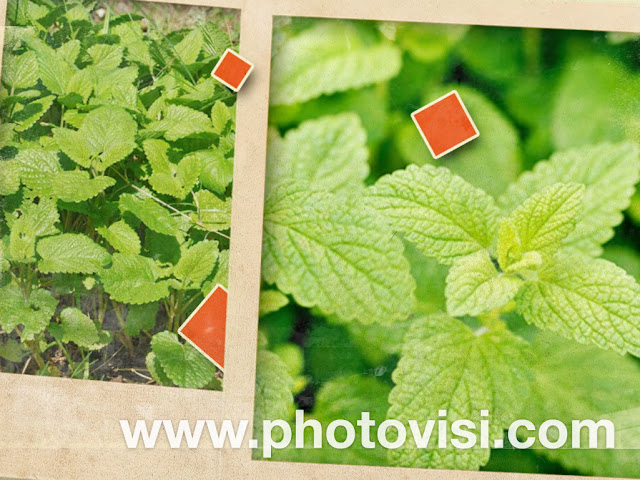Benefits of lemon balm - used for anxiety
Lemon balm is one of the most beloved of the healing herbs. The
scientific name of this herb-Melissa officinalis-reveals much of its
history. It is thought that bees and lemon balm have been inextricably
linked since ancient times. The name scientific name Melissa is derived
from the Greek term for "honey bee." Moreover, many herbalists agree
that lemon balm has much of the same healing and tonic properties that
royal jelly and honey has. Lemon balm has traditionally been honored as
an herb with the ability to lend rejuvenation. During the Middle Ages,
lemon balm was a key ingredient in all medieval elixirs of youth. Even
as late as the 18th century, lemon balm continued to maintain its
reputation as an elixir of youth.
Herbalists describe the character of lemon balm as sour, dry, cold, and slightly bitter. Lemon balm is known to contain volatile oils (including citronellal), polyphenols, bitter principle, tannins, rosmarinic acid, and flavonoids. The actions of the plant have alternately been described as sedative, anti-depressant, a relaxant and restorer, a digestive stimulant, antibacterial and antispasmodic. It has also known for its ability to promote sweating, relax the peripheral blood vessels, and for its antiviral properties.
lemon balm for anxiety find some reviews read here
The leaves of the lemon balm plant are believed to help relieve the symptoms of depression and tension. The leaves are known as carminative, so are thought of as ideal for those individuals who may suffer from digestive upsets when they become anxious or worried. Because of its cooling properties, lemon balm is also good for people who may suffer from feverish colds. The leaves of the lemon balm plant may be used both internally and externally to treat the eruption of cold sores. The herb can be used externally to treat sores or any other kind of painful swelling. The best time to harvest lemon balm is just before flowering. In the summer, the leaves of the lemon balm plant can make a delightfully cooling and refreshing tea.
The essential oil of the lemon balm plant is also popular with herbalists. The concentrated oils from the lemon balm leaves are much more potent than the leaves themselves. Just a few drops of lemon balm essential oil can affect an individual. A few drops of lemon balm essential oil are recommended as an antidote to depression. The potency of lemon balm essential oil is thought to be able to "shock" the depressed patient out of their state. Diluted lemon balm essential oil can also be applied topically to help heal cold sores.
Other popular methods for consuming lemon balm in herbal remedies include as an infusion for hot tea, an ointment, tincture, infused oil, and in a compress. Hot lemon balm tea is used to treat depression, nausea, indigestions, and nervous exhaustion. A lemon balm compress can be applied to any area of suffering from painful swellings, or conditions such as gout. Lemon balm can also be used to create a soothing massage oil. Simply dilute 5-10 drops of essential oil by combining with either almond oil or olive oil, and then rub to relieve chest complaints or other areas of tension.
Herbalists describe the character of lemon balm as sour, dry, cold, and slightly bitter. Lemon balm is known to contain volatile oils (including citronellal), polyphenols, bitter principle, tannins, rosmarinic acid, and flavonoids. The actions of the plant have alternately been described as sedative, anti-depressant, a relaxant and restorer, a digestive stimulant, antibacterial and antispasmodic. It has also known for its ability to promote sweating, relax the peripheral blood vessels, and for its antiviral properties.
lemon balm for anxiety find some reviews read here
The leaves of the lemon balm plant are believed to help relieve the symptoms of depression and tension. The leaves are known as carminative, so are thought of as ideal for those individuals who may suffer from digestive upsets when they become anxious or worried. Because of its cooling properties, lemon balm is also good for people who may suffer from feverish colds. The leaves of the lemon balm plant may be used both internally and externally to treat the eruption of cold sores. The herb can be used externally to treat sores or any other kind of painful swelling. The best time to harvest lemon balm is just before flowering. In the summer, the leaves of the lemon balm plant can make a delightfully cooling and refreshing tea.
The essential oil of the lemon balm plant is also popular with herbalists. The concentrated oils from the lemon balm leaves are much more potent than the leaves themselves. Just a few drops of lemon balm essential oil can affect an individual. A few drops of lemon balm essential oil are recommended as an antidote to depression. The potency of lemon balm essential oil is thought to be able to "shock" the depressed patient out of their state. Diluted lemon balm essential oil can also be applied topically to help heal cold sores.
Other popular methods for consuming lemon balm in herbal remedies include as an infusion for hot tea, an ointment, tincture, infused oil, and in a compress. Hot lemon balm tea is used to treat depression, nausea, indigestions, and nervous exhaustion. A lemon balm compress can be applied to any area of suffering from painful swellings, or conditions such as gout. Lemon balm can also be used to create a soothing massage oil. Simply dilute 5-10 drops of essential oil by combining with either almond oil or olive oil, and then rub to relieve chest complaints or other areas of tension.








